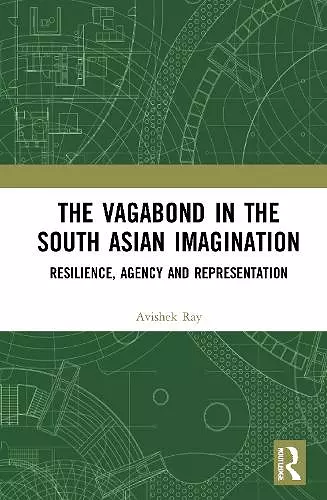The Vagabond in the South Asian Imagination
Resilience, Agency and Representation
Format:Paperback
Publisher:Taylor & Francis Ltd
Published:25th Sep '23
Currently unavailable, and unfortunately no date known when it will be back
This paperback is available in another edition too:
- Hardback£135.00(9780367407575)

This book discusses the epistemic foundation of the heuristic construct ‘vagabond’ and the convergence between the politics of itinerancy and that of dissent in the context of South Asia.
It describes the fraught relationship between ‘native’ itinerant practices and techniques of governmentality which have furnished different categorizations and taxonomies of mobility. The book demonstrates the historical seismic breaks – from the Orientalist to the post-Orientalist, from the premodern to the modern, and from the colonial to the post-colonial – in the representation of the vagabond in the juridico-political imagination, in historiography and cultural articulation. For instance, the drunk European sailor, the quasi-religious mendicant, and the helpless famine refugee have all been referred to as ‘vagabonds’ in the colonial archive. This book examines the histories and conditions behind these conceptual overlaps, as well as the uncanny associations among categories that uneasily coexist and mirror each other as subsets of a vast range of phenomena, which may loosely be called ‘vagabond(age)’.
This volume will be of interest to students and researchers of literature, cultural studies, colonial and post-colonial studies, history, migration studies, sociology, and South Asia studies.
‘Questioning the commonsensical opposition of vagabond to tourist, this wide-ranging and ambitious book resists easy typologies of vagabondage. Instead, it explores the genealogies of the concepts and classifications of vagabondage. It insightfully brings out the ambiguities of the discourse of vagabondage--the often criminalized vagabondage involuntarily adopted by and imposed on the powerless on the one side, and the dissentient vagabondage of insurgents, religious itinerants and restless critics of "society as it is."’—Ajay Skaria, Professor of History, University of Minnesota
‘This agile and dynamic book charts new ways of understanding colonial knowledge formations, through a conceptual mapping of the vagabond as a figure of the imagination, a discourse, and a product of colonial governance. It represents a work of significance to any scholar or student working on the modern and colonial periods in South Asia.’—Anne Murphy, Associate Professor, Asian Studies & Lead, Interdisciplinary Histories Research Cluster, University of British Columbia
‘Vagabonds, gypsies, tramps, and other nomadic figures who refuse to succumb to domesticity have long been feared, despised, and surveilled by the state. Avishek Ray offers an erudite, sophisticated, and politically aware account of the vagabond’s itinerary through South Asia from the pre-colonial period to the present. His book incisively points to the ethical possibilities that inhere in the figure of the vagabond as a source of resistance to state authoritarianism and the seductions of capitalism.’—Vinay Lal, Professor of History at the University of California, Los Angeles (UCLA)
‘Questioning the commonsensical opposition of vagabond to tourist, this wide-ranging and ambitious book resists easy typologies of vagabondage. Instead, it explores the genealogies of the concepts and classifications of vagabondage. It insightfully brings out the ambiguities of the discourse of vagabondage--the often criminalized vagabondage involuntarily adopted by and imposed on the powerless on the one side, and the dissentient vagabondage of insurgents, religious itinerants and restless critics of "society as it is."’—Ajay Skaria, Professor of History, University of Minnesota
‘This agile and dynamic book charts new ways of understanding colonial knowledge formations, through a conceptual mapping of the vagabond as a figure of the imagination, a discourse, and a product of colonial governance. It represents a work of significance to any scholar or student working on the modern and colonial periods in South Asia.’—Anne Murphy, Associate Professor, Asian Studies & Lead, Interdisciplinary Histories Research Cluster, University of British Columbia
‘Vagabonds, gypsies, tramps, and other nomadic figures who refuse to succumb to domesticity have long been feared, despised, and surveilled by the state. Avishek Ray offers an erudite, sophisticated, and politically aware account of the vagabond’s itinerary through South Asia from the pre-colonial period to the present. His book incisively points to the ethical possibilities that inhere in the figure of the vagabond as a source of resistance to state authoritarianism and the seductions of capitalism.’—Vinay Lal, Professor of History at the University of California, Los Angeles (UCLA)
ISBN: 9781032040318
Dimensions: unknown
Weight: 453g
160 pages